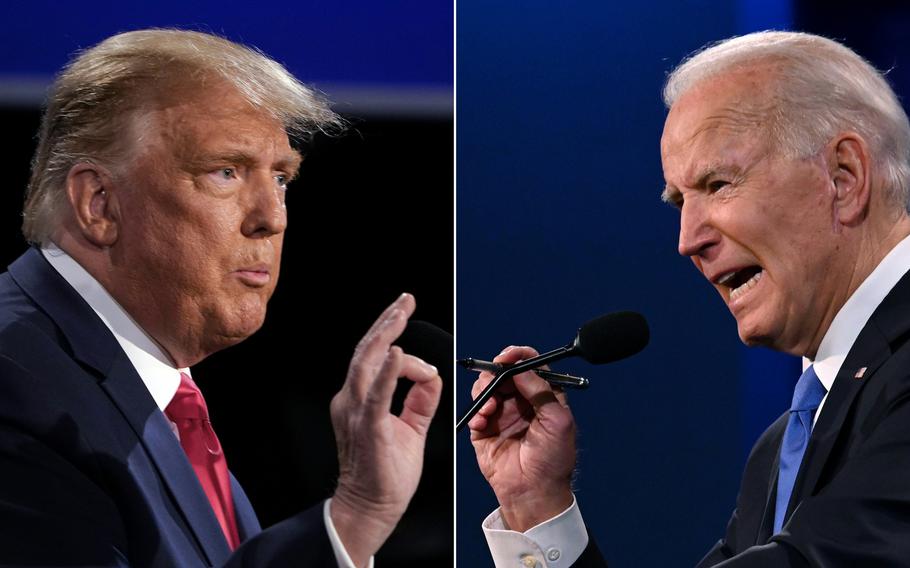
This combination of pictures shows President Donald Trump, left, and Democratic presidential candidate Joe Biden during the final presidential debate at Belmont University in Nashville, Tenn., on Oct. 22, 2020. (Brendan Smialowski and Jim Watson, AFP via Getty Images/TNS)
The recent episode in which 81-year-old Senate Republican Leader Mitch McConnell froze in mid-sentence, unable to complete his thoughts, is inspiring new discussions about President Joe Biden’s decision to seek re-election at a similar age.
In essence, it’s a reminder that Biden and the entire Democratic Party have undertaken what amounts to a high-stakes crapshoot by committing to the 80-year-old president’s unopposed renomination.
“Reluctant to retire, leaders raise a tough question: how old is too old?” asked a New York Times analysis without providing an answer.
In a Washington Post roundtable, eight liberal columnists agreed Biden was mentally up to running again and, on balance, should do so because he is again the likeliest — perhaps the only — Democrat who can beat Donald Trump. But that justification won’t ease nagging concerns about Biden, in part because of what happened when two other iconic Democrats — Supreme Court Justice Ruth Bader Ginsberg and California Sen. Dianne Feinstein — stayed too long.
By refusing to leave when a Democratic president could name her successor, Ginsberg was at least partially responsible for the court’s disastrous reversal of the 1973 decision legalizing abortion rights. Feinstein is closing her historic career as a physically frail, cognitively shaky shell of herself, complicating Democratic efforts to manage the Senate and confirm liberal judges.
The potential parallels are obvious and raise concerns Biden’s decision to run again may also end badly, either through some physical episode during the campaign that enables a vindictive Trump’s return to the presidency or with a disastrous second term.
Biden has been, on balance, a surprisingly good president. After the Afghanistan withdrawal bungle, he provided principled leadership against Vladimir Putin’s unprincipled effort to seize Ukraine. Domestically, he achieved far more than most thought possible, winning enactment of consequential measures like the chips, infrastructure and climate bills whose long-term economic benefits will be felt long beyond his tenure.
In taking their 2024 risk, Democrats count on the fact that, with a strong campaign, incumbent presidents generally win re-election, especially against flawed opponents. This White House does an expert job in managing Biden’s schedule and believes he can counter concerns about his age with Reaganesque humor and strong performances in visible situations like last February’s State of the Union speech. But the potential is always present for some unexpected physical event — like his recent stumble at the Air Force Academy, or worse. The episode involving McConnell is a frightening reminder of what could happen.
Besides, reelection is far more uncertain for presidents with low job approval; Jimmy Carter, George H.W. Bush and Trump all lost. Current polls show Biden’s job approval in the low 40s and his general election numbers even or slightly better against Trump.
On the other hand, if Biden stepped down, the inevitable multi-candidate Democratic contest might reduce the party’s chances of keeping the presidency and, more importantly, keeping Trump out.
It would be great if Biden could invoke the Nancy Pelosi precedent and smooth the succession path to someone clearly recognized as a consensus next-generation leader. But widespread doubts within and outside the Democratic Party about the presidential readiness and political viability of Vice President Kamala Harris make that impossible.
There is no way she would win the party’s 2024 nomination as easily as Rep. Hakeem Jeffries was unanimously elected House Democratic leader. Indeed, there is no guarantee she would win a contested fight.
To be sure, heated primary contests sometimes produce strong tickets, like the Democrats’ 1960 pairing of John F. Kennedy and Lyndon B. Johnson, or the GOP’s 1980 tandem of Ronald Reagan and George H.W. Bush.
The Democrats might choose a potent, younger combination of, say, Michigan Gov. Gretchen Whitmer and Georgia Sen. Raphael Warnock. But it might be politically damaging to bypass Harris, the first woman and first minority vice president.
So far, there is no public sign any top Democrat will oppose Biden’s renomination. But recurring press accounts of private conversations among top Democrats reveal substantial unease — with good reason.
And the first stirring of opposition has surfaced. Rep. Dean Phillips, a business-friendly moderate from the Minneapolis suburbs, said Sunday that Democrats “want not a coronation, but a competition” and warned “the consequences are going to be disastrous” without a competitive race. The 54-year-old congressman, appearing on CBS’ “Face the Nation,” urged “those who are well-positioned, well-prepared, of good character and competency — they know who they are — to jump in.” He said he hasn’t decided if he’ll run if no one else does.
The underlying question is less whether the little-known congressman can mount a viable challenge than whether his initiative spurs one from a better-known Democrat. (Neither current Biden opponent Robert F. Kennedy Jr. or motivational speaker Marianne Williamson is considered a serious foe.) The potential third-party candidacies of progressive activist Cornel West and the bipartisan “No Labels” group add further uncertainty.
In the end, barring the unexpected, Democrats will likely stick with the Biden-Harris ticket with a hope and a prayer nothing untoward happens to the president — and Trump again becomes the GOP nominee. But the election is still 15 months away, and history tells us to expect the unexpected. Until Nov. 5, 2024, many Democrats will remain nervous.
Carl P. Leubsdorf is a former Washington bureau chief of The Dallas Morning News.
©2023 The Dallas Morning News.
Distributed by Tribune Content Agency, LLC.